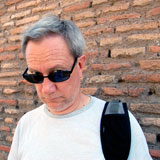Walter Putnam
Professor Emeritus of French

Biography:
Personal Statement:
My doctoral training in comparative literature led to two book-length publications: one on Franco-British literary cosmopolitanism (Gide and Conrad), the other on modernist French poetry (Paul Valéry). The early work on Gide and Conrad dealt with questions of literary exchange, translation and Africa; it was this latter area that became my more central concern throughout the 1990s when I devoted considerable attention to European representations of Africa and to the residual image of Africa that has permeated much western cultural production: literature, cinema, popular culture, travel narratives, museum collections, etc. A parallel interest in animals as literary and cultural figures evolved into my current scholarly project titled "The Colonial Animal."
Educational History:
1985, Ph.D., in Comparative Literature, Université de Paris III - Sorbonne Nouvelle.
Dissertation:
L’Amité Littéraire de Joseph Conrad et d’André Gide.
1980, M.A., in French, Université de Paris III - Sorbonne Nouvelle.
Thesis:
Le Statut des personnages dans Les Faux-monnayeurs d’André Gide.
1978, B.A., in French, Université de Paris III - Sorbonne Nouvelle.
1974, B.A., in English, Duke University.
Research Interests:
- 19th and 20 century French and Francophone Literatures and Cultures
- Colonial and post-colonial studies
- Animal Studies
My doctoral training in comparative literature led to two book-length publications: one on Franco-British literary cosmopolitanism (Gide and Conrad), the other on modernist French poetry (Paul Valéry). The early work on Gide and Conrad dealt with questions of literary exchange, translation and Africa; it was this latter area that became my more central concern throughout the 1990s when I devoted considerable attention to European representations of Africa and to the residual image of Africa that has permeated much western cultural production: literature, cinema, popular culture, travel narratives, museum collections, etc. A parallel interest in animals as literary and cultural figures evolved into my current scholarly project titled The Colonial Animal. Whether as prominent actors or as background décor, animals have played an important role in the colonial project.
Going back to Pliny’s declaration that Africa was a land of wild beasts, animals have been enlisted in the construction of western discourses of savagery, racial difference and cultural alterity. Western knowledge of exotic colonial spaces directly relied on the capture, displacement and display of rare and unusual species, whether in menageries and zoos or through the adventures of King Kong, Babar and Tintin. The western treatment of animals reenacts the fundamental relationship between colonizer and colonized, between master and slave, between superior and subaltern. Indeed, the important debates on conservation and management of wilderness and natural resources in formerly-colonized Africa and Asia revolve around the question of the animal.
Selected Publications:
Books
- Paul Valéry Revisited.
(Twayne World Author Series, division of MacMillan Publishing Co. 1994).
for more information - L’Aventure littéraire de Joseph Conrad et d’André Gide.
(Anma Libri: Stanford French and Italian Studies - Saratoga 1990).
for more information
Articles & Book Chapters
- "The Colonial Zoo." French Thinking About Animals. Eds, Louisa Mackenzie, Stephanie Posthumus. Michigan State UP. Forthcoming.
- “Cultural Displacements in Marie Nimier’s La Girafe.” Dalhousie French Studies. Forthcoming.
- "Objets transculturels: les animaux en peluche." Performances et objets culturels: nouvelles perspectives sous la direction de Louis Hébert et Lucie Guillemette. Montréal: Presses de l'Université Laval (2010): 159-170.
- "J.M.G. ou les paradoxes de la pensée nomade." J.M.G. Le Clézio dans la forêt des paradoxes. Ed. Keith Moser, Bruno Thibault. Paris: L'Harmattan, 2011. Forthcoming.
- "The Colonial Animal." Ed. Margo deMello. Animals & Society: An Introduction to Human-Animal Studies (New York: Columbia UP, 2012): 81-83.
- "Please don't feed the natives: Human Zoos, Colonial Desire, and Bodies on Display." FLS XXXIX (2012): 55-68.
- “'Je est un autre' et les enjeux du devenir-animal.” Latitudes. “Espaces transnationaux et imaginaires nomades en Europe.” 2008: 39-48.
- “Captive Audiences: A Concert for the Elephants in the Jardin des Plantes.” Ed. Una Chaudhuri. TDR: The Drama Review 51:1 (Spring 2007): 154-160.
- Zoophilosophy: InQuantum 2010 Vol. 26 (2010)
- See: Quantum 2010.
- Captive Audiences : A Concert for the Elephants in the Jardin des Plantes.
In TDR 51.1 (Spring 2007). - Gide, le texte bâtard et la critique génétique.
In Bulletin des Amis d’André Gide. 150. (April 2006). - Stuffed Animals and the Predicament of Culture: Lost in the Bedroom Jungle.
In Reconstruction 3.3 (Summer 2003)
See: Solutions/Fixations. - André Gide’s Congo Journey: The Making of Homo performans.
In Current Writing. ed. Sally-Ann Murray. 14.1 (2002). - Raging Against the Night: Céline’s African Episode.
In Discursive Geographies: Writing Space and Place in French/Géographies discursives
(l’écriture de l’espace et du lieu en français). ed. Jeanne Garane. (Editions Rodopi, 2005). - African Animals in the West: Can the Subaltern Growl.
In Remembering Africa, Series: Studies in African Literature. ed. Elisabeth Mudimbe-Boyi (Heinemann 2002). - Writing the Wrongs of French Equatorial Africa:
Gide’s Voyage au Congo and Retour du Tchad.
In André Gide’s Politics. Rebellion and Ambivalence. ed. Tom Conner. (Saint Martin’s Press, 2000).
Teaching Interests:
- 19th and 20th Century French and Francophone Literatures and Cultures
- Love in the French Novel
- Surrealism
- Representations of Africa
- Question of the Animal
- French Cinema
- Autobiography
Representative Courses:
- COMP 224 - The Question of the Animal
- FR 335 - Surrealism
- COMP 580 | MLNG 580 | FREN 580 Le Discours Amoureux
- COMP 580 - Representations of Africa
- FR 580 | PHIL 441 - Zoophilosophy
- FR 580 - French and Francophone Autobiography
 Department Office
Department Office